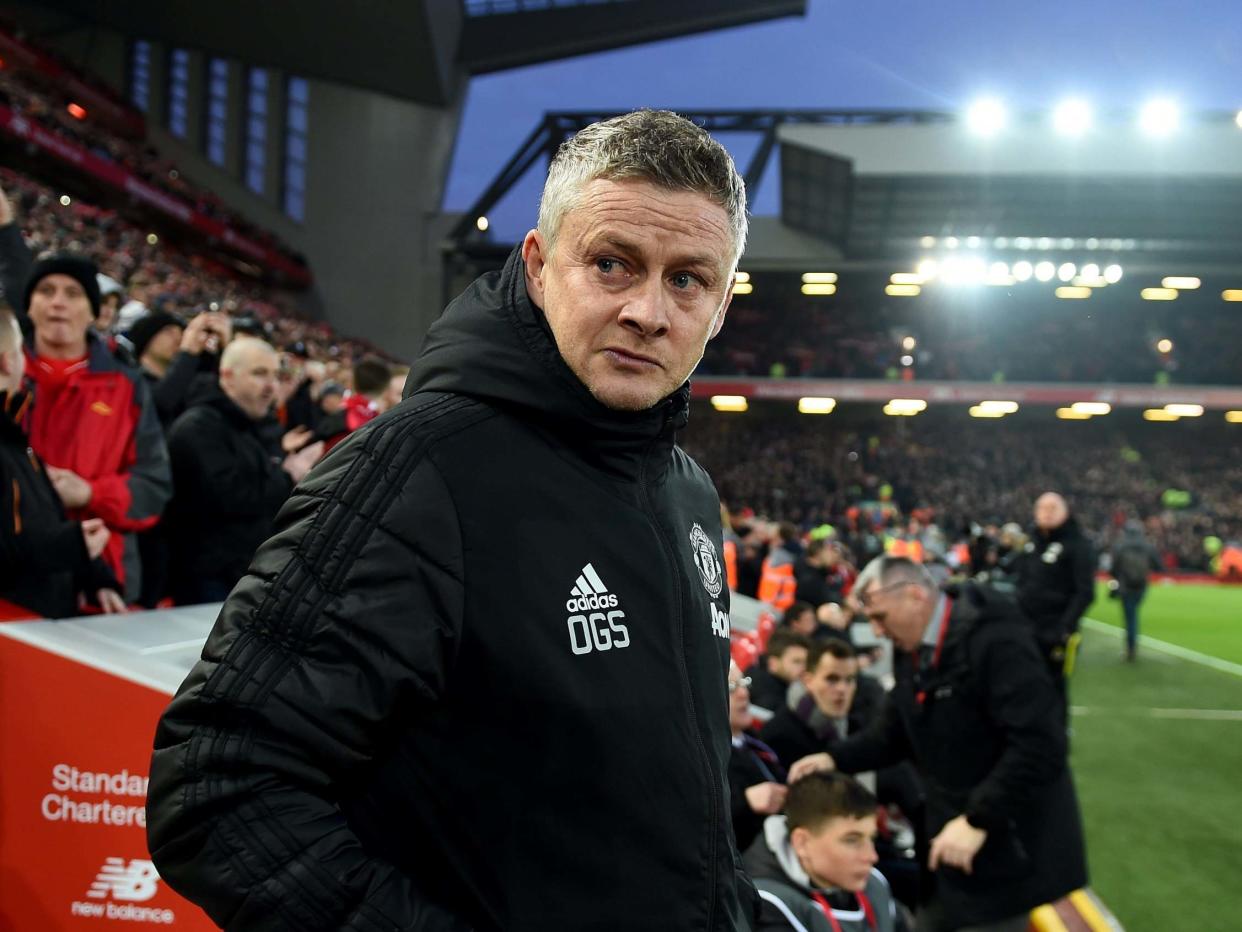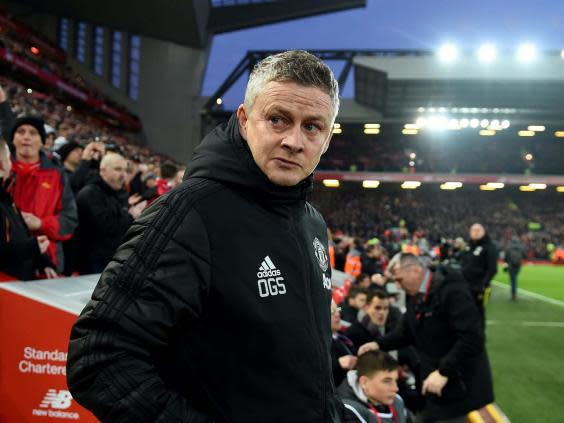If you think transfers are the answer for Manchester United, you’re asking the wrong questions

Despite another game that emphasised the immense difference between Liverpool and Manchester United, it didn’t make too much difference to Ed Woodward’s thinking. The Old Trafford executive vice chairman is obviously persisting with Ole Gunnar Solskjaer, but also persisting with the same negotiation stance as regards Bruno Fernandes. United just aren’t going to bend on their valuation, which is currently £20m short of Sporting’s, even though they badly need some creativity. The danger remains they go through this window without bringing in a midfielder of that quality.
Solskjaer was naturally asked about this after the game, but said “today is not about the transfer window”. That’s a bit curious given that he had brought up potential signings just moments earlier, but sums up some of muddled thinking at United right now.
It has been so much so that it’s actually difficult to know exactly how much blame to apportion where, but there is a lot of it to go around. This defeat to the league leaders was yet another landmark low that prompted high-tension debate about what’s going wrong, who is at fault, and how exactly they have fallen so far behind Liverpool.
It should be so galling to everyone at the club. This was supposed to be a painful problem banished to the past by Sir Alex Ferguson’s era. United are now wondering how to solve it again. The manner they have let that slip away should haunt them, and drive everyone at the club to Ferguson levels. The suspicion remains that the extent of it hasn't yet sunk in.
Even allowing for the intelligence of Liverpool’s infrastructure, it isn’t too long ago that a turnaround like this just seemed impossible. United simply had too much wealth, too unassailable a position.
It is that wealth, of course, that should frame all of this discussion.
It is also why Solskjaer is someway correct. Sunday’s game was not about the transfer window.
No recruitment decisions should ever be made on the basis of one game, or short-term issues. “Permanent targets are not going to change because of injuries,” Solskjaer said, with total justification. Fernandes is a case in point.
United absolutely should not invest so much in such a player if it affects summer business, and the pursuit of superior targets like James Maddison. There is a logic there, even if the Fernandes business still itself points to some of the dysfunction at the core of the club. This is after all a playmaker who United made a point of stating they had no interest in last summer, only to suddenly go back on that in this window, while raising questions about how they negotiate these deals.
It’s also true that United badly need purchases. This squad is short of what it should be, particularly in a remarkably poor midfield. That is undeniable.
But Sunday was "not about the transfer window" for another reason, too. It was as much about what Solskjaer does with his existing squad.
It can be simultaneously true that there are problems at United way beyond the manager and that the manager himself is a problem too.
There is still little evidence, beyond that initial winning run last year, that Solskjaer is up to this. There is a lot of cause for concern. There is most of all that win percentage of just under 37%. That is the worst for any manager in the club’s history, despite the fact they have a financial advantage genuinely unprecedented in that time.
It would similarly be a mistake to think that doesn’t condition the current team. The supposed poverty of the squad is often overstated. The defence is highly expensive and - according to sources, and United's own recruitment - pretty much exactly as they want it. This is apparently their ideal for that backline, all the more so when they have been insistent on a British base. They aren’t currently targeting any other primary defenders.
Despite that, and an English centre-half of true aerial power in Harry Maguire, they have conceded eight goals from set-pieces in a mere 22 matches this season. Virgil van Dijk’s opening goal in the Liverpool game exposed this again.
What does it say of the club’s coaching in that regard? What does their overall defensive record say? United have conceded 27 in total, more than one a game. That isn’t much return on the investment in defence. That of course is a recurring theme across the squad.
United similarly have one of the most promising attacks in Europe, in Marcus Rashford, Anthony Martial and now Mason Greenwood - at least as regards pure talent. To give Solskjaer his due, much of that is down to his personal investment in youth, that is in sync with the club’s values.
But there are still questions about what he does with that attack, most of all regarding Rashford’s injury, and how one of the squad's most important players was used in the last few days. Sources say he was “in agony” at the start of last week. He was somehow still in a situation where one substitute appearance in the FA Cup caused a stress fracture to become a double stress fracture.
And that’s before you even get to the ideas about the structure of the attack, and the overall idea of play.

That is again admittedly affected by the personnel problems in midfield, but it’s not like those actually picked for the centre are showing evidence of a pattern of play.
Most of their “attacks” in the Liverpool match were just hopeful individual surges from deep, mainly through Fred and Andreas Pereira. One of them almost seemed comically symbolic, as it saw Pereira forced to double back on himself and then just fall into Daniel James.
It looks so basic next to what Jurgen Klopp and Pep Guardiola are doing. And that’s not just what they’re doing now.
For all that the poverty of Solskjaer’s squad is brought up, Klopp’s first squad at Liverpool was very different to what it was on Sunday. And yet you could still definitively say the design was there four years ago: co-ordinated pressing, lightning attacks from learned patterns. Solskjaer has similar personnel issues to what Klopp had then, but there is nothing like the same level of approach. There often just seems a hole in the middle, where so many attacks fall down, to go with the absences. Signings like Fernandes - or, better, Maddison or Jack Grealish - would go someway to solving this and help win a certain amount of matches through a badly-missing individual brilliance. But they wouldn’t offer the collective co-ordination that is actually required to start bridging the gap to Liverpool and City.
It is also why the argument about “time” is misplaced, and mistaken. It is just the wrong of looking at it.
Put bluntly, if Solskjaer did not have a prior association with United, there is absolutely no way a club of that magnitude would have appointed a manager whose only experience was relegation with Cardiff City and titles in the Norwegian league. He just wouldn't have been looked at.
The argument about “time” should really be about how long it would have taken Solskjaer to come into contention for such a job if his managerial career was viewed in isolation.
A frequent response to this is that United can’t just keep chopping and changing coaches. But that is a nonsense logic, as it shouldn’t mean you keep going with someone who really may not be the right man, when there are so many better candidates out there.
That’s what it should be about: getting - to quote City’s executives - the “best in class”. That is what United should be about, not hopeful punts - either in play, or as regards the manager. Antonio Conte’s impact on Internazionale shows how quickly even a basket-case club can be improved.
It is actually a dark day when United are looking at minor improvements in performance in a pretty convincing defeat to Liverpool as some kind of positive, especially when that opposition are effectively celebrating a 19th title. That is how far the standards have fallen. That is where a big difference is really needed.
Read more
Don’t be fooled, lightweight United are no longer on Liverpool’s level


